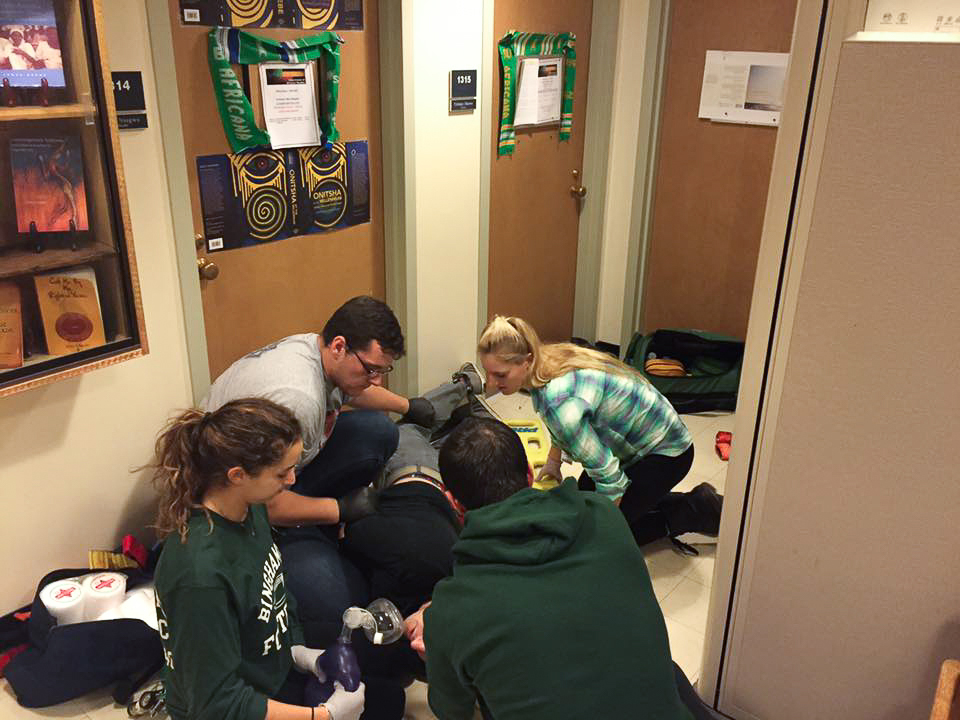According to the National Institute on Alcohol Abuse and Alcoholism (NIAAA), when an individual consumes enough alcohol to reach the legal intoxication level of .08 percent in a two-hour period, they are binge drinking — a fact that indicates binge drinking is common among college students, including those at Binghamton University.
In Pipe Dream’s 2019 drug survey, roughly 23 percent of respondents indicated they drank three times per week or more frequently, and 71.1 percent said that they have vomited while intoxicated — a sign of alcohol poisoning, which is often associated with binge drinking, according to the NIAAA. About 7 percent of respondents indicated they have been transported to a hospital for medical attention while drunk.
J. David Jentsch, a professor of psychology at BU who studies genetic and environmental factors in drug and alcohol use, wrote in an email that binge drinking is most commonly observed in adults aged 18 to 34, and is the most common form of alcohol consumption for individuals under 21. Although alcoholism and binge drinking are different, Jentsch wrote that some of the factors that contribute to binge drinking, including genetics, family history, fetal alcohol exposure and childhood trauma, can also indicate certain individuals are more likely to experience alcoholism than others.
“Several of these factors are unchangeable and generally predict a continuing pattern of binge-drinking when people transition to adulthood,” Jentsch wrote. “These people are at high risk of eventually developing an alcohol use disorder.”
Caitlin Bomse, a senior majoring in chemistry, said she has noticed examples of binge drinking among the University’s student body.
“Binge drinking is something I’ve seen a lot of in the past few years at Binghamton,” Bomse said. “I’ve seen my friends feel pressured to go out every weekend and get wasted because that’s what their friends want to do. Every weekend I see a new Snapchat of someone spending the night in the hospital after a night out.”
While binge drinking can happen repeatedly, it still is not classified as a chronic disorder like alcoholism, according to Jentsch.
“[Alcoholism] describes someone who has a relapsing pattern of excessive drinking that persists despite negative life consequences, resists attempts to quit or reduce intake and may be associated with withdrawal — a sickness state — when alcohol is not consumed,” Jentsch wrote. “It is also often associated with a persistent desire to drink.”
But binge drinking still has the potential to leave lasting effects, according to Terrence Deak, a professor of psychology at BU. Deak wrote in an email that the brain continues to develop through an individual’s mid-20s, and binge drinking can inhibit its progress.
“It is important to keep in mind that the brain is not fully matured into an ‘adult-like’ state until 23 to 25 years old,” Deak wrote. “Thus, binge drinking during these ages can be particularly detrimental to brain development.”
Linda Spear, a distinguished professor of psychology at BU, wrote in an email that binge drinking’s impact on brain development can come with a variety of consequences.
“Much of the research examining this in humans is just being conducted and results are slow to come, given that it can take 10 [to] 20 years or more to look for lasting effects in human studies,” Spear wrote. “That is why we and others have used simple animal models to examine consequences of exposure to alcohol during the adolescent-to-emerging-adulthood years. These studies have shown lasting cognitive deficits on certain learning tasks, anxiety and numerous lasting brain alterations. In terms of immediate effects, there are typical hangover effects that include mild malaise, anxiety, depression and so on.”
Binge drinking can also eventually transition into alcoholism, according to Spear.
“Importantly, people differ in their propensity to develop alcoholism,” Spear wrote. “Those individuals who are least sensitive to alcohol’s effects — who can drink a lot before they get drunk — are particularly likely to develop alcoholism.”
Students tend to drink more at different points of the year, according to Sarah Castor, chief and executive director of Harpur’s Ferry and a second-year graduate student studying public administration. Castor wrote in an email that the number of calls Harpur’s Ferry receives regarding alcohol consumption fluctuates every weekend, but emergency medical responders notice some patterns.
“We tend to have an increased volume of calls related to alcohol consumption during weekends,” Castor wrote. “There is typically a more notable increase around Halloween and weekends where the weather is warmer and concerts.”
Luz Velazquez, a sophomore majoring in psychology, said students often lean on binge drinking as a form of stress management, and she predicts binge drinking will increase leading up to final exams.
“Binge drinking is something many college students look forward to on weekends and this really disrupts their mental capacity because it makes students wait until the weekend to deal with stressors in an unhealthy manner,” Velazquez said. “This causes students to avoid talking about their feelings and avoid seeking out mental assistance because they think alcohol can solve their temporary issues.”



